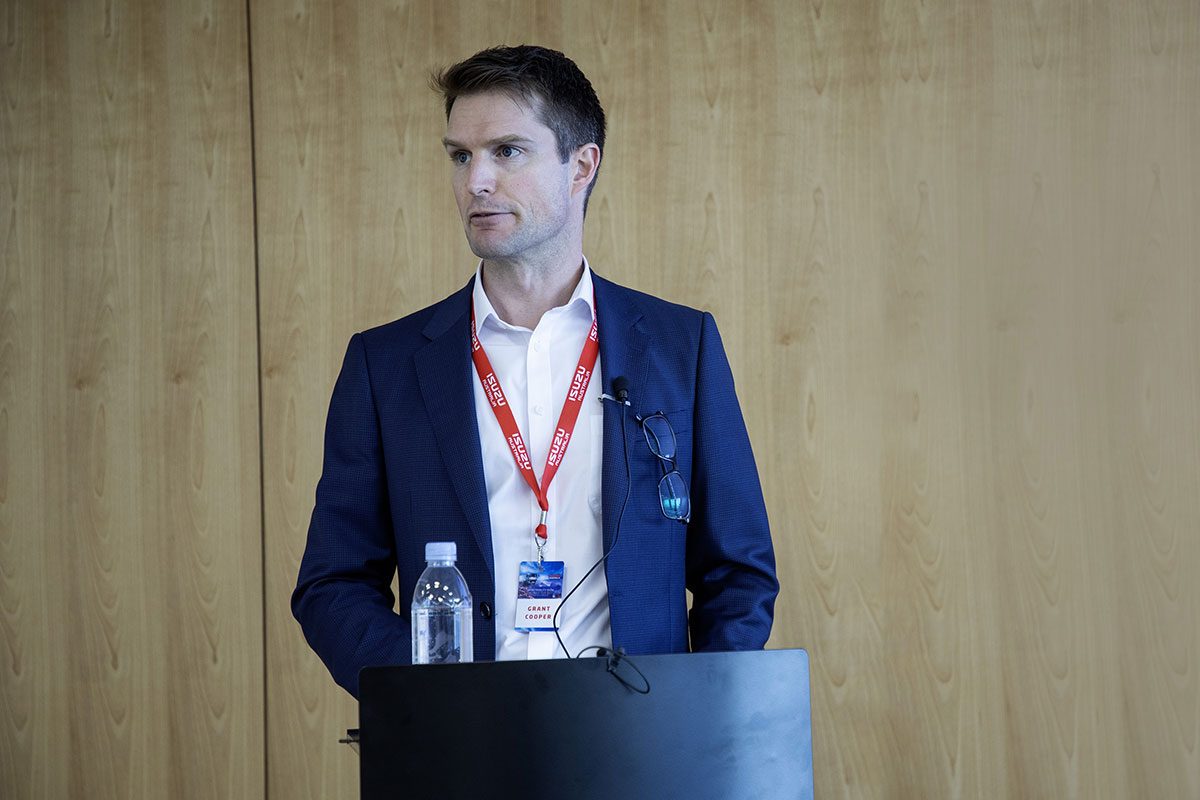Hyundai goes heavy-duty with hydrogen
In the rapidly changing world of commercial vehicles, we‘re keeping abreast of what could potentially head over the horizon. This month, Hyundai has taken the first step in entering the European market for ecofriendly, heavy-duty vehicles and has previewed its H2 Xcient fuel cell electric truck.

Photo: From left: Rolf Huber, chairman of the Swiss start-up H2Energy; Jihan Ryu, chief engineer for trucks at Hyundai; Edward Lee, member of the board, responsible for commercial vehicles at Hyundai; Mark Freymueller, CEO Hyundai Hydrogen Mobility; Jens Waldeck, Linde; Amédée Murisier, responsible for hydro power at Alpiq.
Green mobility and increasingly strict regulations are the order of the day in most major European cities, which is driving the rapid development of alternative fuel vehicles. But it‘s not only European vehicle manufacturers that are sitting up and taking note – Hyundai has shown its intent to be a leading supplier of clean mobility commercial vehicles in Europe, aiming to bring 1600 fuel cell electric heavy-duty trucks to market by 2025. To do so, earlier this year it teamed up with Swiss hydrogen giant H2 Energy to form the joint venture Hyundai Hydrogen Mobility (HHM). HHM has now forged a partnership with Hydrospider (a joint venture between H2 Energy, Swiss energy services provider and electricity producer Alpiq, and gas and engineering company Linde), which produces 100% green hydrogen and delivers it to hydrogen refuelling stations. The venture will offer the H2 Xcient in a specially designed green ecosystem to the members of the H2 Mobility Switzerland Association, as well as to other transport and logistics companies promoting hydrogen mobility in Switzerland. According to Mark Freymueller, CEO of HHM, the aim is to have 50 H2 Xcient vehicles in customer operation around Switzerland during 2020. The vehicles will be made available on a pay-per-use model, with the cost covering the operation of the truck, maintenance, fuel cell system and battery replacements, and hydrogen supply. Naturally, HHM intends to expand its presence into other European countries, with solutions and partner networks being established in Germany, the Netherlands, Austria and Norway. “We believe that our strong business case demonstrates both the economic and ecologic viability of fuel cell truck mobility,” says Edward Lee, executive vice president and head of commercial vehicle division, Hyundai Motor.
Developed according to European regulations, the H2 Xcient seems to be quite the eco-friendly piece of kit. Sure, the basics are all there: a 4×2 chassis cab with a low deck and day cab, but that‘s about where the similarities with a conventional, dieselpowered vehicle end. Powering the H2 is a new 190kW hydrogen fuel cell system made up of two 95kW fuel cell stacks connected in parallel. These provide the 661V, 73.2kWh Akasol battery with power for the H2‘s 350kW, 3400Nm Siemens electric motor. A 6-speed Allison S4500 automatic transmission sends drive to a 4.875:1 rear axle. Fed by seven large hydrogen tanks with a storage capacity of almost 35kg, the H2 Xcient offers a range of approximately 400km on a single hydrogen fuelling. The maximum gross vehicle weight is 19,000kg and the maximum gross combination weight measures in at 34,000kg. The whole unit sits on 2-bag front and 4-bag rear air suspension, while braking is by discs all round with a 4-speed retarder and resistor. Vehicle safety is well taken care of with standard fitment of front collision avoidance assist, smart cruise control, EBS and vehicle dynamic control, and lane departure warning.

Photo: The Hyundai H2 Xcient fuel cell electric truck: same, but different.
The driver‘s job is made a little bit easier with the likes of an air-suspended, heated and cooled seat, heated side mirrors, Apple CarPlay, Android Auto and Mirror Link connectivity, and Hyundai‘s Connected Car Service smartphone app. This allows the driver to check up on various aspects of the vehicle including conducting status checks and remote diagnosis on the truck and refrigeration unit, as well as allowing them to find HRD locations and truck operation info. A smart tachograph is fitted, as is a web-based vehicle monitoring system. Jihan Ryu, chief engineer for trucks at Hyundai, explains that fuel cell electric vehicles form the basis of Hyundai‘s eco-friendly commercial vehicle development strategy for medium- and heavy-duty vehicles, as these are more suited to high-capacity (16 to 40 tonnes), mid- to long-distance (up to 500km a day) operations. Conversely, the company will offer battery electric vehicles to serve light- and medium-duty vehicle operations, where low-capacity (four to 16 tonnes), short-distance (less than 300km a day) running is the order of the day.
The development of these vehicles has been based on customer usage, while there is standardisation and common use of major components across the various models – and even with Hyundai‘s passenger cars – says Ryu. Of course, Hyundai is no stranger to eco-friendly commercial vehicles, having initiated fuel cell development in 1998. In 2006 it developed fuel cell electric buses for the FIFA Word Cup in Germany, with its latest fuel cell electric city bus launching in 2019. Now, the reveal of the H2 Xcient represents the move to a new paradigm in heavy-duty transport for Hyundai, says Ryu.





